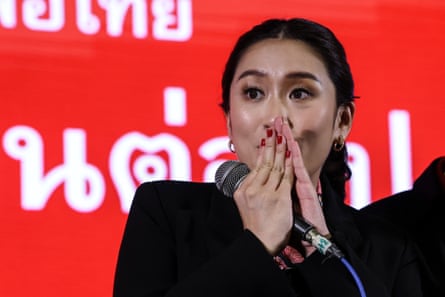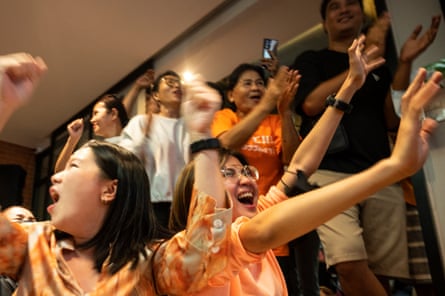Thailand’s opposition parties secured by far the largest number of votes in national elections, trouncing parties allied with the military and setting the stage for a flurry of deal-making in a bid to end nearly a decade of conservative, army-backed rule.
The liberal Move Forward party and the populist Pheu Thai Party were far out in front with 99% of votes counted, but it’s far from certain either will form the next government, with parliamentary rules written by the military after the 2014 coup skewed in its favour.
To rule, the opposition parties will need to gain support from members of the junta-appointed Senate that has sided with military parties and gets to vote on who becomes prime minister and form the next administration.
Sunday’s election saw the Move Forward party, which wants to reform Thailand’s strict royal insult laws, ride a wave of support from young voters to come close to a clean sweep of the capital Bangkok on a platform of institutional reform and dismantling monopolies.
The election commission is not expected to officially confirm the final number of seats won by each party for several weeks, but forecast early on Monday that Move Forward would win 113 out of a total of 400 constituency seats, just ahead of Pheu Thai on 112. A further 100 seats will be allocated to parties on a proportional basis.
A Reuters calculation showed both opposition parties set to win more than triple the number of seats of Palang Pracharat, the political vehicle of the junta, and the army-backed United Thai Nation party. The turnout was about 39.5 million, or 75% of registered voters.
The Election Commission is not expected to officially confirm the final number of seats won by each party for several weeks.
Pheu Thai has won most votes in every ballot since 2001, including two landslide victories, but three of its four governments have been ousted from office.

Founded by the Thaksin Shinawatra, Pheu Thai remains hugely popular among the working classes and was banking on being swept back to power in a landslide on nostalgia for its populist policies like cheap healthcare, micro-loans and generous farming subsidies.
The party is now led by Thaksin’s daughter Paetongtarn who had been tipped to follow in the footsteps of her father and of her aunt, Yingluck Shinawatra, and become prime minister. Yingluck and Thaksin were both overthrown in coups.
Paetongtarn said she was happy for Move Forward, but it was too soon to discuss alliances.
“The voice of the people is most important,” she said.
Move Forward leader Pita Limjaroenrat, a 42-year-old former executive of a ride-hailing app, described the outcome as “sensational” and vowed to stay true to his party’s values when forming a government.
“It will be anti-dictator-backed, military-backed parties, for sure,” he told reporters. “It’s safe to assume that minority government is no longer possible here in Thailand.”
He said he remained open to an alliance with Pheu Thai, but has set his sights on being prime minister.
“It is now clear the Move Forward Party has received the overwhelming support from the people around the country,” he said on Twitter.
Move Forward courted the support of 3.3 million first-time voters for its liberal agenda, including plans to weaken the military’s political role and amend the strict lese majesty law – which outlaws and punishes criticism of the monarchy – that critics say is used to stifle dissent.

The preliminary results will be a blow for the military and its allies. But with parliamentary rules on their side they could still have a role in government.
A joint session of the 500-seat House of Representatives will be held with the 250-member Senate in July to select the new prime minister, a process widely seen as undemocratic because the Senators were appointed by the military rather than elected, but vote along with Sunday’s winning lawmakers.
Prime minister Prayuth Chan-ocha, a retired general who led the last coup, had campaigned on continuity after nine years in charge, warning a change in government could lead to conflict.
On Sunday, he slipped away quietly from his United Thai Nation party headquarters, where there were few supporters to be seen. “I hope the country will be peaceful and prosper,” Prayuth told reporters. “I respect democracy and the election. Thank you.”
The returns were a good sign for democratisation, said Saowanee T. Alexander, a professor at Ubon Ratchathani University in northeastern Thailand.
“This is people saying that we want change … They are saying that they could no longer take it. The people are very frustrated. They want change, and they could achieve it,” she said.
Reuters and Agence France-Presse contributed to this report


